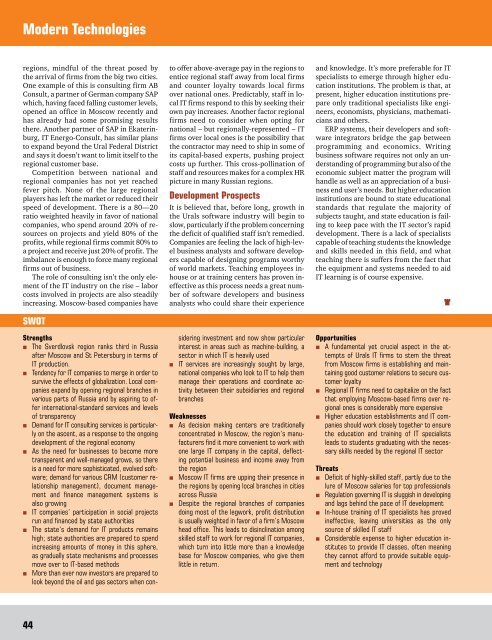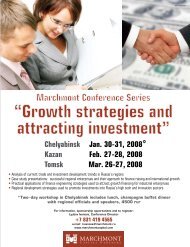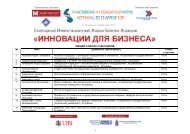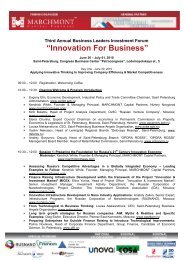ekaterinburg and sverdlovsk region - Marchmont Capital Partners
ekaterinburg and sverdlovsk region - Marchmont Capital Partners
ekaterinburg and sverdlovsk region - Marchmont Capital Partners
Create successful ePaper yourself
Turn your PDF publications into a flip-book with our unique Google optimized e-Paper software.
Modern Technologies<br />
<strong>region</strong>s, mindful of the threat posed by<br />
the arrival of firms from the big two cities.<br />
One example of this is consulting firm AB<br />
Consult, a partner of German company SAP<br />
which, having faced falling customer levels,<br />
opened an office in Moscow recently <strong>and</strong><br />
has already had some promising results<br />
there. Another partner of SAP in Ekaterinburg,<br />
IT Energo-Consult, has similar plans<br />
to exp<strong>and</strong> beyond the Ural Federal District<br />
<strong>and</strong> says it doesn’t want to limit itself to the<br />
<strong>region</strong>al customer base.<br />
Competition between national <strong>and</strong><br />
<strong>region</strong>al companies has not yet reached<br />
fever pitch. None of the large <strong>region</strong>al<br />
players has left the market or reduced their<br />
speed of development. There is a 80—20<br />
ratio weighted heavily in favor of national<br />
companies, who spend around 20% of resources<br />
on projects <strong>and</strong> yield 80% of the<br />
profits, while <strong>region</strong>al firms commit 80% to<br />
a project <strong>and</strong> receive just 20% of profit. The<br />
imbalance is enough to force many <strong>region</strong>al<br />
firms out of business.<br />
The role of consulting isn’t the only element<br />
of the IT industry on the rise – labor<br />
costs involved in projects are also steadily<br />
increasing. Moscow-based companies have<br />
SWOT<br />
Strengths<br />
55 The Sverdlovsk <strong>region</strong> ranks third in Russia<br />
after Moscow <strong>and</strong> St Petersburg in terms of<br />
IT production.<br />
55 Tendency for IT companies to merge in order to<br />
survive the effects of globalization. Local companies<br />
exp<strong>and</strong> by opening <strong>region</strong>al branches in<br />
various parts of Russia <strong>and</strong> by aspiring to offer<br />
international-st<strong>and</strong>ard services <strong>and</strong> levels<br />
of transparency<br />
55 Dem<strong>and</strong> for IT consulting services is particularly<br />
on the ascent, as a response to the ongoing<br />
development of the <strong>region</strong>al economy<br />
55 As the need for businesses to become more<br />
transparent <strong>and</strong> well-managed grows, so there<br />
is a need for more sophisticated, evolved software;<br />
dem<strong>and</strong> for various CRM (customer relationship<br />
management), document management<br />
<strong>and</strong> finance management systems is<br />
also growing<br />
55 IT companies’ participation in social projects<br />
run <strong>and</strong> financed by state authorities<br />
55 The state’s dem<strong>and</strong> for IT products remains<br />
high; state authorities are prepared to spend<br />
increasing amounts of money in this sphere,<br />
as gradually state mechanisms <strong>and</strong> processes<br />
move over to IT-based methods<br />
55 More than ever now investors are prepared to<br />
look beyond the oil <strong>and</strong> gas sectors when con-<br />
to offer above-average pay in the <strong>region</strong>s to<br />
entice <strong>region</strong>al staff away from local firms<br />
<strong>and</strong> counter loyalty towards local firms<br />
over national ones. Predictably, staff in local<br />
IT firms respond to this by seeking their<br />
own pay increases. Another factor <strong>region</strong>al<br />
firms need to consider when opting for<br />
national – but <strong>region</strong>ally-represented – IT<br />
firms over local ones is the possibility that<br />
the contractor may need to ship in some of<br />
its capital-based experts, pushing project<br />
costs up further. This cross-pollination of<br />
staff <strong>and</strong> resources makes for a complex HR<br />
picture in many Russian <strong>region</strong>s.<br />
Development Prospects<br />
It is believed that, before long, growth in<br />
the Urals software industry will begin to<br />
slow, particularly if the problem concerning<br />
the deficit of qualified staff isn’t remedied.<br />
Companies are feeling the lack of high-level<br />
business analysts <strong>and</strong> software developers<br />
capable of designing programs worthy<br />
of world markets. Teaching employees inhouse<br />
or at training centers has proven ineffective<br />
as this process needs a great number<br />
of software developers <strong>and</strong> business<br />
analysts who could share their experience<br />
55<br />
sidering investment <strong>and</strong> now show particular<br />
interest in areas such as machine-building, a<br />
sector in which IT is heavily used<br />
IT services are increasingly sought by large,<br />
national companies who look to IT to help them<br />
manage their operations <strong>and</strong> coordinate activity<br />
between their subsidiaries <strong>and</strong> <strong>region</strong>al<br />
branches<br />
Weaknesses<br />
55 As decision making centers are traditionally<br />
concentrated in Moscow, the <strong>region</strong>’s manufacturers<br />
find it more convenient to work with<br />
one large IT company in the capital, deflecting<br />
potential business <strong>and</strong> income away from<br />
the <strong>region</strong><br />
55 Moscow IT firms are upping their presence in<br />
the <strong>region</strong>s by opening local branches in cities<br />
across Russia<br />
55 Despite the <strong>region</strong>al branches of companies<br />
doing most of the legwork, profit distribution<br />
is usually weighted in favor of a firm’s Moscow<br />
head office. This leads to disinclination among<br />
skilled staff to work for <strong>region</strong>al IT companies,<br />
which turn into little more than a knowledge<br />
base for Moscow companies, who give them<br />
little in return.<br />
<strong>and</strong> knowledge. It’s more preferable for IT<br />
specialists to emerge through higher education<br />
institutions. The problem is that, at<br />
present, higher education institutions prepare<br />
only traditional specialists like engineers,<br />
economists, physicians, mathematicians<br />
<strong>and</strong> others.<br />
ERP systems, their developers <strong>and</strong> software<br />
integrators bridge the gap between<br />
programming <strong>and</strong> economics. Writing<br />
business software requires not only an underst<strong>and</strong>ing<br />
of programming but also of the<br />
economic subject matter the program will<br />
h<strong>and</strong>le as well as an appreciation of a business<br />
end user’s needs. But higher education<br />
institutions are bound to state educational<br />
st<strong>and</strong>ards that regulate the majority of<br />
subjects taught, <strong>and</strong> state education is failing<br />
to keep pace with the IT sector’s rapid<br />
development. There is a lack of specialists<br />
capable of teaching students the knowledge<br />
<strong>and</strong> skills needed in this field, <strong>and</strong> what<br />
teaching there is suffers from the fact that<br />
the equipment <strong>and</strong> systems needed to aid<br />
IT learning is of course expensive.<br />
Opportunities<br />
55 A fundamental yet crucial aspect in the attempts<br />
of Urals IT firms to stem the threat<br />
from Moscow firms is establishing <strong>and</strong> maintaining<br />
good customer relations to secure customer<br />
loyalty<br />
55 Regional IT firms need to capitalize on the fact<br />
that employing Moscow-based firms over <strong>region</strong>al<br />
ones is considerably more expensive<br />
55 Higher education establishments <strong>and</strong> IT companies<br />
should work closely together to ensure<br />
the education <strong>and</strong> training of IT specialists<br />
leads to students graduating with the necessary<br />
skills needed by the <strong>region</strong>al IT sector<br />
Threats<br />
55 Deficit of highly-skilled staff, partly due to the<br />
lure of Moscow salaries for top professionals<br />
55 Regulation governing IT is sluggish in developing<br />
<strong>and</strong> lags behind the pace of IT development<br />
55 In-house training of IT specialists has proved<br />
ineffective, leaving universities as the only<br />
source of skilled IT staff<br />
55 Considerable expense to higher education institutes<br />
to provide IT classes, often meaning<br />
they cannot afford to provide suitable equipment<br />
<strong>and</strong> technology<br />
44











